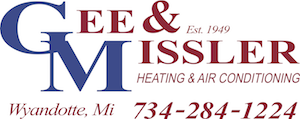
If you’re uncertain whether your Wyandotte home has bad indoor air quality (IAQ), it possibly does.
We are indoors a lot. As a matter of fact, we’re inside up to 90% of the time, according to the U.S. Environmental Protection Agency. And the air inside homes could be 2–5 times worse than outdoors, which could create long-term health concerns.
Most Common Sources of Poor IAQ
We’ve made a list of the most frequent origins of bad IAQ, the issues they cause and how you can take care of these indoor air pollutants. If you’re concerned about the air inside your residence, we suggest talking with a pro like Gee & Missler Heating & Air Conditioning about which products are ideal for your home.
Volatile Organic Compounds
Volatile organic compounds, or VOCs, are chemicals released by everyday household products.
They’re found in paint and stains along with:
- Furniture
- Carpet
- Building materials
- Cleaning products
- Cosmetics
- Air fresheners
- Candles
When these fumes accumulate inside, they might irritate your eyes, nose and throat. They might also create headaches and nausea. Regardless of whether your house is in a rural or industrial space, an EPA study found indoor levels of these pollutants can be 2–5 times higher than the air outside.
Always use the manufacturer’s instructions when painting or cleaning. Cracking a window can help chemicals dissipate faster.
Air purification systems can also help. This equipment partners with your heating and cooling unit to freshen indoor air. When seeking one, ensure it’s specifically designed to eliminate VOCs.
Dust and Pet Dander
Dust and pet dander can trigger health problems like asthma and allergies, especially when it constantly gets redistributed by your residence’s comfort system. While you can vacuum more routinely and buy an improved air filter, an air filtration system might be a better match.
This unit hooks to your HVAC equipment to provide strong filtration. Some models provide hospital-level filtration for eliminating particles and bioaerosols.
Persistent Odors
Newer homes are securely sealed to enhance energy efficiency. While this is good for your utility expenses, it’s not so good for your IAQ.
Stuffy odors can hang around for a greater amount of time as your residence is pulling in less fresh air. Because keeping your windows open throughout the year isn’t doable, here are two methods you can make your indoor air smell better.
An air purification system is installed in your ducts to neutralize odors before they are redistributed. Look for one with a carbon filter and the ability to eliminate dangerous VOCs. These systems can also help keep your household healthy by getting rid of most bacteria and ordinary allergy triggers like pollen and mold spores.
A ventilation system removes stuffy indoor air and replaces it with crisp outdoor air. There are two types of systems (heat recovery and energy recovery), so ask our professionals for more details on which solution is best for your residence.
Unsteady Humidity
It’s critical your house’s humidity keeps even. Air that has too much moisture can cause mold, while dry air can cause respiratory issues.
Our techs suggest 40–50% for the best comfort. To keep yours even, consider getting a whole-home humidifier or whole-home dehumidifier with your comfort equipment.
Rather than having to pull a humidifier from room to room, this equipment delivers consistent humidity across your house.
Carbon Monoxide
Carbon monoxide is colorless gas you can’t smell. It occurs when there’s insufficient combustion in fuel-burning units, like gas heating systems, water heaters or fireplaces.
It produces a severe health risk. In low levels, it can create flu-like symptoms like headaches and nausea. It can be deadly in large levels.
We suggest yearly furnace maintenance to double-check your system is working like it should. This service allows our technicians to see troubles before they begin, including malfunctions that can cause carbon monoxide leaks.
The best method to keep your home free of carbon monoxide is to install detectors. These alarms must be on all floors close to bedrooms and living rooms.
Improve Your House’s Air Quality with the Gee & Missler Heating & Air Conditioning Experts
Informed that your house has poor air quality but not sure how to enhance it? Or unsure which option is a good fit for you? Give our approachable HVAC experts a call at 734-284-1224 or contact us online right away. With free estimates and professional support, we’ll help you locate the ideal solution for your family and budget.


